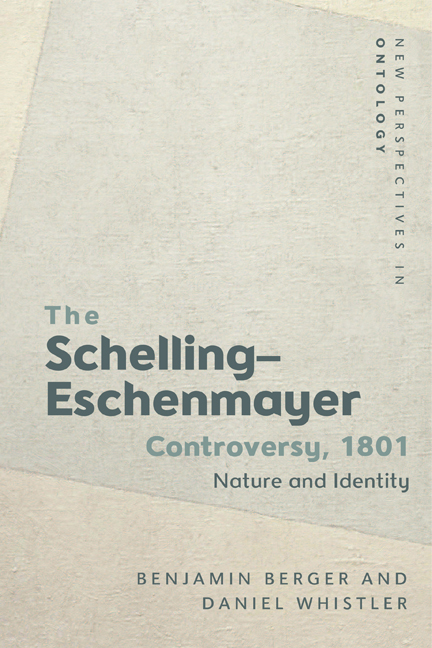Book contents
- Frontmatter
- Contents
- Preface
- Translators’ Note
- Abbreviations
- Introduction: Schelling and Eschenmayer in 1801
- Part I Texts
- Spontaneity = World Soul, or the Highest Principle of Philosophy of Nature
- On the True Concept of Philosophy of Nature and the Correct Way of Solving its Problems
- Part II Commentaries
- 1 Quality
- 2 Potency
- 3 Identity
- 4 Drive
- 5 Abstraction
- Part III Appendices
- Appendix 1 Correspondence, 1799–1801
- Appendix 2 Principles of Nature-Metaphysics Applied to Chemical and Medical Subjects [Extracts]
- Appendix 3 Deduction of the Living Organism [Extracts]
- Appendix 4 Review of F. W. J. Schelling’s First Outline of a System of Philosophy of Nature and Introduction to his Outline
- Notes
- Bibliography
- Index
5 - Abstraction
Published online by Cambridge University Press: 03 October 2020
- Frontmatter
- Contents
- Preface
- Translators’ Note
- Abbreviations
- Introduction: Schelling and Eschenmayer in 1801
- Part I Texts
- Spontaneity = World Soul, or the Highest Principle of Philosophy of Nature
- On the True Concept of Philosophy of Nature and the Correct Way of Solving its Problems
- Part II Commentaries
- 1 Quality
- 2 Potency
- 3 Identity
- 4 Drive
- 5 Abstraction
- Part III Appendices
- Appendix 1 Correspondence, 1799–1801
- Appendix 2 Principles of Nature-Metaphysics Applied to Chemical and Medical Subjects [Extracts]
- Appendix 3 Deduction of the Living Organism [Extracts]
- Appendix 4 Review of F. W. J. Schelling’s First Outline of a System of Philosophy of Nature and Introduction to his Outline
- Notes
- Bibliography
- Index
Summary
In the Preface to the Phenomenology of Spirit, Hegel contrasts the proper ‘coming-to-be’ of science – which, ‘in order to become genuine knowledge … must travel a long way and work its passage’ – with ‘the rapturous enthusiasm which, like a shot from a pistol, begins straight away with absolute knowledge, and makes short work of other standpoints by declaring that it takes no notice of them’. While Hegel's targets remain unnamed throughout this preface, there is little doubt that something like the Schellingian position of 1801 is here intended. It is, indeed, one of the most persistent prejudices against the variant of Schelling's philosophy under discussion in this volume that it lacks method, that it installs itself in the absolute straightaway (‘like a shot from a pistol’) without any concern for how to get there, that it enthusiastically and naively affirms immediate certainty of the absolute.
A classic anglophone repetition of this Hegelian attack is to be found in Michael Forster's Hegel and Skepticism. In order to rescue Hegel from the criticism that he ‘acknowledged no epistemological responsibilities toward his philosophical system’, Forster converts Schelling into the true culprit instead:
Schelling, whose philosophy of identity had a decisive and lasting influence on Hegel, really was guilty of being cavalier in matters epistemological in much the way that Hegel is often wrongly supposed to have been. Thus, Schelling accepted his philosophy of identity in a crudely dogmatic manner as the gift of an alleged faculty of ‘intellectual intuition,’ understood as an unteachable, absolute precondition of philosophical insight the possession of which justified the philosopher in a complete disregard of all other viewpoints.
Forster goes on to accuse Schelling of ‘dogmatic appeal to intellectual intuition’ and ‘epistemological shortcuts’. More recently, in ‘Schelling and Skepticism’, Forster has revisited this critique: the Schelling of 1801 (the Schelling of On the True Conceptand Presentation of my System of Philosophy) is presented once again as an epistemologically naive dogmatist. That is, Forster insists that Hegel's criticism of Schelling as rehearsed above is applicable at least to ‘certain phases of Schelling's career, especially to the period when Hegel first came to Jena to collaborate with Schelling, i.e., roughly 1801–2’.
- Type
- Chapter
- Information
- The Schelling-Eschenmayer Controversy, 1801Nature and Identity, pp. 162 - 184Publisher: Edinburgh University PressPrint publication year: 2020



